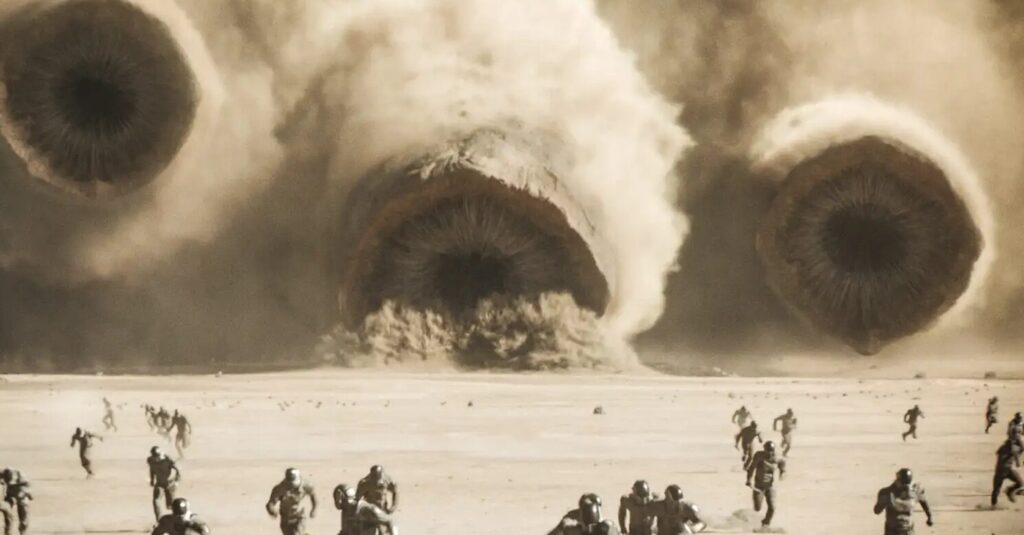Dune Part 2 Movie Recommendation and Book Comparisons. Dune Part 2 is out – I just walked out of the IMAX Fan Sneak Peek and absolutely adored it. So many good things to say about how Part 2 wrapped up the novel, and how Denis has set this thing up for a really obvious third film. Basically, this is the Dune Empire Strikes back. But really only for people familiar with the book. Others I went with seemed really happy with the conclusion. REGARDLESS, I think I was completely Water of Life intoxicated last night because this thing riddled my subconsciousness and played out in my dreams throughout the night last night even though I wrote long into the night after walking out of the theater. So, let’s stop the delay tactics and see if we can’t talk through this film.
First, I’ll be covering the differences between the book and the film. There are tons of differences. But by and large Villeneuve really kept to the heart of the book. But some of the changes he made were really strategic, and will have ripples out into this wider arc of the literature universe.
Dune Part 2 Is a Triumph
It goes without saying that Denis Villeneuve’s sequel – it picked up right where Dune 1 left off, and wove itself into the Dune universe and literature narrative seamlessly. Frank Herbert’s epic unfurls once more on a canvas so vast it makes other blockbusters seem like mere preschool wall scribbles. It was lovely to venture back into the shifting sands of Arrakis, and to finally see the curtains raised once again for audiences worldwide. My only hope now? Is that Denis Villeneuve will crush it at the box office with Dune Part 2, so much so that he will get his greenlight in the next couple weeks for turning Dune Messiah into Dune Part 3. But we’ll get into that in more detail in a moment.
If you’ve read the book, you know that the political machinations are nearly inscrutable to the reader, let alone to a movie goer. That Villaneuve was able to even attempt to make sense of it for audiences in Part 1 is a testament to his brilliance. That he was able to bring all the various threads and chaos together into a nicely tied bow is the real magic of the Kwisatz Haderach.
But what did Denis Villaneuve do differently between the ending of the book Dune, and Part 2? I was curious how this was going to go as well. So let’s start our deep dive there, shall we?

The Differences between Dune Part 2 and the book Dune
Denis took needed liberties between the book and the movies. And the movies, though they were true to the form and function of the book, liberally played out the details to serve its own purposes. These aren’t in any particular order, but I have tended to save the larger changes to later in this list:
1. Rebecca Ferguson’s Lady Jessica Takes Center Stage – Come on, Rebecca Ferguson is one of the greatest actresses of all time. And she is gloriously beautiful to boot. That Lady Jessica’s role is greatly expanded won’t get any complaints from me. The heightened role of the Bene Gesserit was an enormous change in the movies. Again, it’s obviously important, but to watch this battle go back and forth between the mother and the son is really interesting in this new expanded role.
2. Zendaya’s Chani’s Amplified Importance – Another departure involves Zendaya’s Chani, Paul’s Fremen wife. Recognizing the character’s significance beyond the novel’s portrayal, “Dune 2” delves deeper into the relationship between Paul and Chani, offering a more nuanced exploration of their connection and potentially expanding Chani’s role in the Fremen’s conflict with the Harkonnens. Also, Chani sort of nurtures Paul’s disbelief in the prophecy of his being the Messiah – a counterweight that really wasn’t there in the book.
3. Gurney Halleck and Glossu Rabban’s Rematch – At the end of Dune Part 1 – we watch as Gurney Halleck runs off into the battle, and then later we see their forces being decapitated. We only presume that Gurney Halleck died in the frey. And while there wasn’t a clash between these two characters in the original novel, this clash adds an exciting dynamic to the film, a real epic confrontation during the Fremen’s battle with the Harkonnens.
4. Emperor Shaddam IV’s Altered Appearance – Christopher Walken’s portrayal of Emperor Shaddam IV deviates from the source material, presenting the Emperor as older than his novel counterpart. This choice emphasizes the Emperor’s authority and experience, contributing to a more formidable on-screen presence. I thought it an interesting choice for Denis to cast Walken in this role… and half expected him to start a dance battle in the film’s triumphant ending.
5. Princess Irulan’s Expanded Role – we watch as Princess Irulan (played by Florence Pugh) narrates the happenings and her wisdom into logs. This is a motif that comes from Dune Messiah I believe. (Someone correct me, I’m too tired to look this up.) Also, it was interesting to see Irulan, a fairly peripheral character in Herbert’s novel, assume a more substantial role in Dune Part 2. This shift provides an opportunity to delve into Irulan’s character beyond her initial brief appearance, enriching the narrative and setting the stage for her expanded significance in subsequent books. It also illuminates her role in the Bene Gesserit order, which will play a more significant role in the story of Part 3 (if Denis gets his greenlight that is.)
6. Feyd-Rautha’s Altered Appearance – In a crucial change, Feyd-Rautha’s character is modified to align more closely with the Harkonnen aesthetic. Departing from the novel’s portrayal, this adjustment aims to create visual cohesion within the Harkonnen family, avoiding potential narrative dissonance. Originally, in the book, he was seen as an attractive and charismatic individual… a really elegant person. He was contrasted starkly with the horrible appearance of his uncle. But, I would imagine, in order to help the audience keep him aligned with the Harkonnens, his appearance was changed.
7. Paul Calls Declares War on the Houses at the End – In the book, Paul comes to realize that the Fremen have reached a fevered pitch about his role as the Kwisatz Haderach. And he realizes that while he has achieved his goal, he is no longer able to stop the Fremen jihad, as their belief in him is too powerful to restrain. But in the movie, he proactively calls the Fremen to war against the houses. Might seem like a small difference, but I didn’t get any sort of sense that the Southern faction (which is a made-up concept in the movies) compelled him into war.
8. Alia’s Transformative Moment Undergoes Modification – I don’t want to give up too much about a potential film 3, but to say that Alia, Paul’s sister will be important will be an understatement. In the book, Alia is born soon after the fall of the house of Atreides, and grows up over the course of the book. But in the movie, she remains in utero, and communicates with her mother throughout… heightening Lady Jessica’s arc, and also the importance of Alia’s poisoning by the Water of Life. Better yet… #9
9. Paul kills the Baron Vladimir Harkonnen: But of course he does, I hear my readers pshawing at their phones. I mean, what else would make sense. How else would we get that satisfying ending, revenge for his father, the house, and his family?
Well, my dear, intrepid reader, in the book, Alia is the one who kills the Baron Vladimir Harkonnen. And, oh, by the way? She does it as A TWO YEAR OLD. Alia, marinating, in utero, in a spice melange, coupled with her poisoning by the Water of Life is not part of a normal utero development life cycle. Yeah, really not ideal for raising a normal child. So to say that Alia is weird when she is born is the understatement of the decade. When she is born, she is fully cognizant of all the Bene Gesserit knowledge and she is fully capable of speech… at birth. It isn’t explained in the original Dune book how Alia kills the Duke, save that “she did what anyone would do.” But in Book 3, Children of Dune, we learn that in that moment, the Bene Gesserit Reverend Mother Mohiam, seeing her as an abomination, orders the Duke to kill Alia. But instead, after being picked up by the Duke, she stabs him with a poisoned tip Gom Jabbar. (Yeah, that Gom Jabbar that the Reverend Mother threatened Paul with back in Part 1, in that amazing scene during the The Gom Jabbar Test of Humanity.)
10. Dune 2’s Final Scene – as the movie ends, we watch as a really complicated love triangle is setup for Dune 3 between Paul/Chani/Irulan. Frank Herbert did not shy away from politically incorrect love stories between his characters. Doubt this? Just look at the relationship between Duke Leto (Paul’s father) and Lady Jessica in Duke 1. They weren’t married. (She isn’t titled as Duchess after all.) Politically, it couldn’t happen. Why? because as long as Duke Leto wasn’t married, he had something interesting to offer the other houses.
Something similar is happening here between Paul, Chani & Irulan. Like father like son. Paul sees a very narrow pathway. As the movie ends he has done two huge things that many viewers might not innately grasp. 1. Paul has voided the Emperor’s handing Arakkis to House Harkonnen. Paul is arguing that when Duke Leto died, he passed the title of Duke to himself. I mean, he does have the signet ring after all. 2. He ascends to title of Emperor himself through his political maneuvering in taking Irulan’s hand in marriage. Paul is no longer just the head of House Atreides and Arrakis, but the leader over all the houses, and the galaxy. It’s a massive, just enormous leap. But why did he do it? HUGE SPOILERS FOR PART 3 if it’s ever made: Ultimately you will find that he did it as the only path forward towards protecting the people of Dune, the Fremen. He put his love for Chani secondary to his love for the Fremen people.
The Reasons These Changes Are Critical in Dune Part 2
Denis Villeneuve knows that the critical story arc of Frank Herbert’s book is the story of his ascendancy to his role as the Kwisatz Haderach. The Moses figure leading the Fremen onward to the promised land. (Or a revitalization of the planet Arrakis as it were… a land of oceans and rivers, not sand and dunes.) And everything else is secondary to that storyline. Denis has set as the secondary story to be watched carefully is the love story between Paul and Chani. But readers of the book all know where that is going. (No, no I will not tell you what happens in Messiah. You are one search away from ruining that surprise for yourself, and I’m not going to do it for you.) But in order to make these two things crystal clear, a lot of changes had to be made to clarify/simplify/focus the watcher’s attention on these topics.
And let’s talk about these two items a moment. Chani is Paul’s muse in the book and also in the movie. She is his angel and his savior. (So much so, that when Paul, (aka Muad’Dib, Usul, and the Kwisatz Haderach of the Bene Gesserit) takes the Water of Life, and all but dies, in the movie, Denis has Chani give Paul a tear, laced with more Water of Life in order to revive him. She literally brought him back to life.) And this love story is one for the ages, a tragic car crash encounter that was prophesied hundreds, and thousands of years prior.
Denis has gone all in on this question of whether or not Paul is the Kwisatz Haderach. In the book? It’s not really much of a question at all. Seems pretty obvious that Paul is the guy and we just watch as layer after layer prove this fact out. But in the movie, there is a whole wide swath of debate about whether he is a religious figure or not. Paul even wonders aloud whether or not he should use his status as the alleged Kwisatz Haderach to his own political purposes. And for 90% of Part 2, it’s pretty clear Paul doesn’t really think he’s the Kwisatz. Even as part 2 ends, it’s still not 100% clear what he really believes. Are the facts of Paul’s life just arbitrarily aligning with the prophecies? Is it just politically expedient to utilize the prophesies as a tool for assisting with his revenge against the Harkonnens?
The laser-focused targeting of the plot, and the complicated machinations of the book, is critical. The only book that I’ve ever read that was more complicated politically is Game of Thrones. It’s really a very dense and complicated world that we’ve been thrust into.
Final Reflections
Please go see this movie in IMAX. Not specifically for the larger screen (which was fantastic) but for the sound design and soundtrack. Hans Zimmer just crushed this soundtrack. And to hear it in the full, six-channel, multi-way digital speaker system (44 speakers behind the screen and at the back of the theater), is to be alive. Nothing like it. Great job Mr. Zimmer. Just amazing.
Dune 2 is decidedly the second movie of three. It is the Empire Strikes Back of the Star Wars Trilogy. The final scene demands a third movie. I presumed that Messiah would be a potential tack on if Part 2 crushed it out of the park. And Denis said, nah, I will force audiences to want a third. They will pillage, and burn if they don’t get the third film. And that we will. It’s definitely going to happen now. There are some rumors out there that Denis is going to take a break from the Dune universe to do something else. Which I get. But when Dune 2 beats Dune 1’s $402 million at the box office against a $165 million budget, Warner Brothers will definitely have to greenlight 3 within the month of March 2024. I’d bet my car on that one.
Can’t get enough Dune? HBO is currently in production for a television series called Dune: Prophecy (previously titled, Dune: Sisterhood), about the Bene Gesserits Sisterhood, which sounds like an amazing world to dive into. It will be set hundreds if not thousands of years in the past and it will presage the coming of the Kwisatz Haderach.
One last thing. I wasn’t going to post this… but I think I will. I was trying to remember, and connect the dots between Paul and Feyd and to see just exactly how they are cousins. The obvious connection is between Jessica and Baron Harkonnen. But the lesser understood connection is from the Baron down to the Neh-Baron. But be warned, there are a few spoilers on here for Part 3. So if you want to go into 3 completely blind, don’t keep scrolling…
Edited by: CY

One thing to note. Since you are still here (surprisingly), is that, similar to how Jessica’s allegiance was to the Sisterhood of the Bene Gesserits, so too was Tanida Nerus. (And notice, the same is true for Irulan Corrino as well.) The Sisterhood’s plan was for Jessica to have a daughter, and that she would be paired with Feyd – and from that union would be a play for a male air and the Kwisatz Haderach. But Jessica foiled all those plans with her decision to have a male heir. Happy to be corrected on that front. But I believe that was the plan all along.



